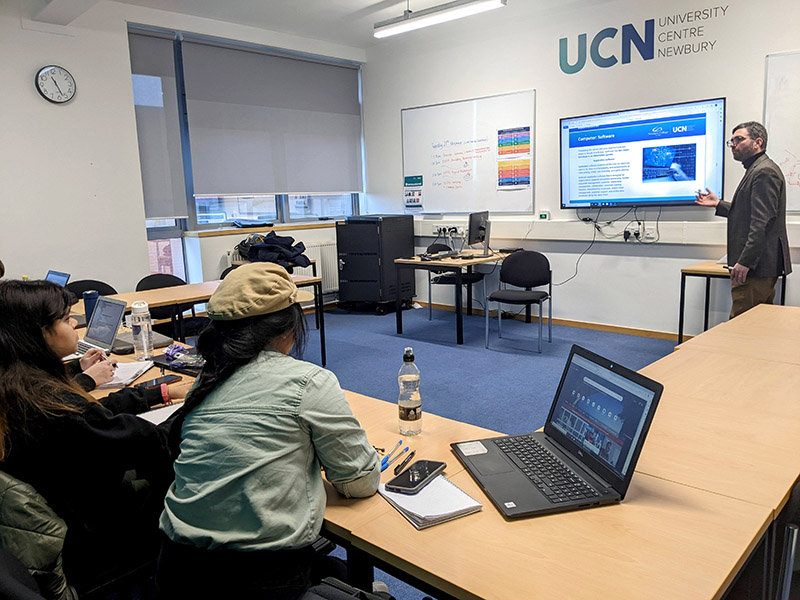- Courses
- Courses
- Subjects
- Art and Design
- Beauty and Hairdressing
- Business, Accountancy and Management
- Catering, Cookery and Hospitality
- Child Care and Education
- Construction and Building Technology
- Digital Technology (inc. Media and Music)
- Engineering
- Essential Skills (English and Maths)
- Football Academies
- Health, Social and Public Services
- Modern Languages
- Motor Vehicle
- Performing Arts
- Sport and Fitness
- Help to choose
- Career Search
- Course Explorer
- Information, Advice and Guidance
- Programme Picker - What should I study?
- Information & Support
- Information & Support
- Information
- About Newbury College
- Qualifications Guide
- College Term Dates
- Getting to Newbury College
- Corporation
- Information for Parents
- Information for Schools
- Policies
- Information for Employers
- Student Services
- Information, Advice and Guidance
- How to enrol
- Fees, Funding and Financial Support
- Student Discounts
- Student Support
- Equality, Diversity and Inclusion
- Student Support
- Safeguarding, Behaviour and Prevent
- Exams and results
- Keeping you safe
- News & Events
- Vacancies
- Facilities
- Contact Us
Business News
In today's rapidly evolving job market, apprenticeships are emerging as a crucial solution for professional development and career advancement. By dispelling common myths, it becomes evident that these programmes offer versatile, valuable, and accessible opportunities for individuals across all backgrounds and age groups. This revelation underscores the growing importance of apprenticeships in fostering a skilled and adaptable workforce.
1. Myth: Apprenticeships are only for young people
Apprenticeships are not limited by age. While many apprentices are young, seeking alternatives to traditional academic routes, people of all ages can benefit from apprenticeships. In fact, many adults pursue apprenticeships to retrain, upskill, or change careers. Governments and organisations often support adult apprenticeships to foster lifelong learning and address skill shortages in various industries. The average age of a learner at the University Centre Newbury (UCN) is mid-30s.
2. Myth: Apprenticeships are hard to set up
With guidance from apprenticeship providers such as Newbury College, employers receive help with the logistics, paperwork, recruitment, onboarding, and compliance, making the process more manageable for businesses of all sizes. At UCN, tutors host workshops and provide mentoring for employers to help them prepare for and maximise their investment in apprentices.
3. Myth: Apprenticeships are for those who don’t perform well at school
Apprenticeships are valuable educational pathways that suit a wide range of individuals, including high achievers. They offer practical, hands-on experience and skills development in real-world settings, which can be highly beneficial to learners and employers. Many apprenticeship programmes require strong competencies in specific areas, and they can lead to advanced qualifications and career progression.
4. Myth: Apprenticeships are only for manual jobs
Apprenticeships are available in a diverse range of fields beyond traditional manual and trade jobs. Modern apprenticeships encompass sectors like technology, healthcare, finance, engineering, creative industries, and more. This diversity allows individuals to pursue apprenticeships in many high-demand and high-skill areas, offering career opportunities across a broad spectrum of professions. At Newbury College, learners can study engineering, product design, and leadership to a degree level and even gain a master’s degree in engineering.
5. Myth: Apprenticeships are low paid
While entry-level apprenticeships might have lower starting salaries, many apprenticeship programmes offer competitive wages that increase with skill level and experience. Apprenticeships provide valuable on-the-job training that can lead to well-paid positions in various industries. Employers invest in apprentices because they become highly skilled professionals, contributing significantly to the business. Existing employees embarking on a degree apprenticeship, such as the Chartered Management Degree Apprenticeship, can also benefit from this pathway.
To find out how we can support your business, contact the Business Team via email This email address is being protected from spambots. You need JavaScript enabled to view it.
As West Berkshire's innovative higher-education provider, we are introducing a bespoke short Artificial Intelligence (AI) and Machine Learning (ML) course this autumn.
New laws passed through the Skills and Post-16 Education Act (Skills Bill) have supported Newbury College’s position of offering “careers, not courses”.
The new “Skills and Post-16 Education Act” is changing the post-16 education landscape to “level up” opportunities and make it easier for adults to train to get the skills they need to secure well-paid jobs in industries with skills gaps.
Why develop an Environmental and Sustainability policy and how to get started.
In July, our Director of Business and Partnerships, Dr Jo Houghton joined the Digital Skills panel at the Future Skills Summit.
We are delighted to announce that the new Renewables Centre is being introduced by Newbury College and University Centre Newbury to expand the delivery of skills for renewable energy systems and engineering.
The government's skills development strategy highlights the importance of putting employers at the heart of the system so that education and training lead to jobs that can improve productivity and the efficiency of businesses.
While students and employers have provided positive feedback regarding the continuation of learning both for mainstream students and apprentices, we are delighted to see a flurry of activity in the workshops and learning spaces once again.
At the beginning of May, I received a link to a blog stating that the future of apprenticeships is in the balance. I sent my reply that I happen to disagree, and here is the reason why.
In this difficult time, employers and training providers are doing their best for their workforce. We want to support that by ensuring that, wherever possible, apprentices can continue and complete their apprenticeship, despite any break they have to take as a result of COVID-19.
A career is a lot like a relationship. We fall in love with the promise and excitement of new challenges, eager with enthusiasm, but as time goes by, it's easy to get stuck in a rut.











